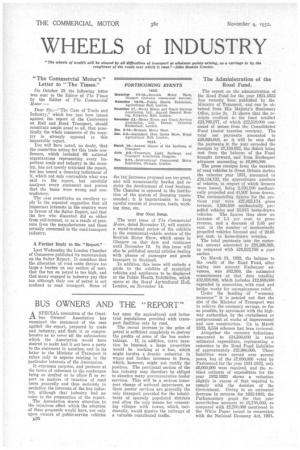BUS OWNERS AND THE "REPORT"
Page 38

If you've noticed an error in this article please click here to report it so we can fix it.
ASPECIAL committee of the Omnibus Owners' Association has examined the statement of the case agfdrisI the report, prepared by trade and industry, and finds it so comprehensive as to cover all the submissions which the Association would have desired to make had it not been a party to the statement in question, and in. its letter to the Minister of Transport it refers only to aspects relating to the particular interests of the Association.
It expresses surprise, and protests at the terms of reference to the conference being so drafted as to allow It to report on matters of taxation of road users generally and thus seriously to prejudice the interests of the bus industry, although that industry bad no voice in the preparation of the report.
The Association draws attention to the injurious effect which the adoption of these proposals would have, not only upon owners of public-service vehicles B20 but upon the agricultural and industrial populations provided with transport facilities only by road.
The recent increase in the price of petrol is sufficient completely to destroy the profits of some of the bus under
takings. If, in addition, extra taxation be imposed, a large proportion would he working at a loss, which might involve a drastic reduction in wages and further increases in fares, which, however, might not rectify the position. The provincial section of the bus industry may -therefore be obliged to abandon many unremunerative feeder services. This will be a serious transport change of national importance, as these poorer services are generally the only transport provided for the inhabitants of sparsely populated districts and often the only means for connecting villages with towns, which, incidentally, would deprive the railways of a valuable contributed traffic.




































































































